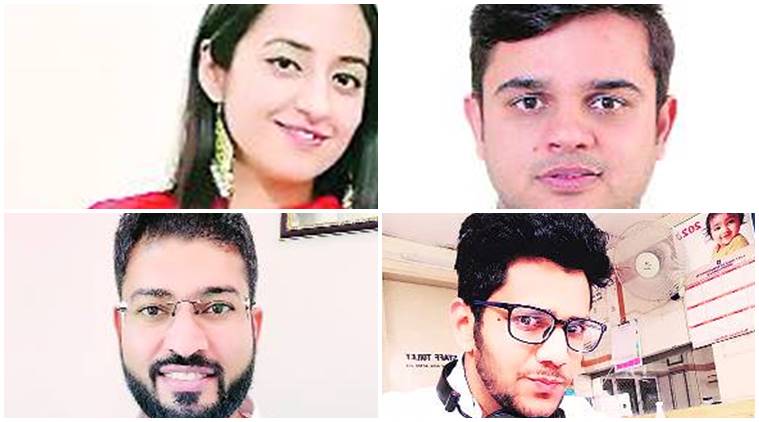 (Clockwise from top-left) Dr Chhavi, Dr Abhishek Deshwal, Dr Varun Bajaj, and nursing officer Dulychand Yadav
(Clockwise from top-left) Dr Chhavi, Dr Abhishek Deshwal, Dr Varun Bajaj, and nursing officer Dulychand Yadav
With no family members of patients allowed inside Covid wards at hospitals, healthcare workers often have the additional task of serving as the link between patients and attendants — from facilitating phone calls to sometimes wiping their tears. Their stories:
Dr Abhishek Deshwal (37), Sharda Hospital, Greater Noida
Recently, the Covid ICU in-charge at the hospital arranged for a tiny speaker to play the Gayatri Mantra for a 66-year-old patient, at the behest of his attendant. Apart from this, Deshwal has briefed nursing officers in the ICU to ensure patients get to speak to their family members through a dedicated phone inside the ICU. He said, “Patients are in a morbid environment, they can’t meet their spouse or children. They worry about death, and the only thing that helps is hearing a familiar voice. So nursing officers hold the phone and help with a short video-call.” Deshwal said the idea came when the ICU admitted its first Covid case, a 44-year-old man, whose wife too had tested positive but was not in the ICU.
Dr Chhavi (29), Safdarjung Hospital
On Tuesday as the doctor went about her night duty in the Covid ICU, the landline rang, and the son of a patient wept and asked her to convey a message to his father. “The attendant asked me to tell his father that ‘hum yahan theek hain, aap bas jaldi se ghar aa jao.’ The patient told me he was not worried anymore,” said Chhavi. The ICU has a landline that rings 24×7, said the doctor. “No one is allowed phones inside, even healthcare workers. The disease causes a lot of anxiety and we get calls from attendants who just say ‘please save my relative’. They ask if they can send homemade food, fruits, milk, even clothes. We don’t allow it. We are their only link to the patient, and we take each call without getting irritated.”
Nursing officers at Rajiv Gandhi Super Speciality and Lok Nayak hospitals
Apart from doing her nursing officer duty, a 36-year-old who did not wish to be named said she also plays the attendant some days. A senior citizen patient slipped in the toilet recently, and the nursing officer found herself tending to him. “In pre-Covid times, patients would usually have an attendant around; now that job rests on us.”
At Lok Nayak hospital, a 40-year-old nursing officer said she helped a Covid patient quickly meet his 70-year-old uncle, who also had Covid and was being rushed to the ICU. “It wasn’t much, but the nephew was overwhelmed and started crying,” said the nurse.
Dr (Major) Varun Bajaj (35), Safdarjung hospital
“Patients feel abandoned due to lack of contact with family, and develop a psychosis of sorts. Sometimes, they realise the person on the adjacent bed has died, and that too scares them… In one case, a patient’s relative handed over a non-camera phone to us, and we made them talk. We tell attendants beforehand about this,” said Bajaj. He recalled a time he had to counsel a patient, who was also a doctor, to not insist on leaving the ICU. “He was so restless, I had to convince him to stay, read a book. A relative then sent a book, which was first sanitised, and then handed over.”
Nursing officer Dulychand Yadav (25), AIIMS
Coconut water and juice for a teenager, and a religious thread around the bed post of another young patient — Yadav has been playing a key role in helping attendants remain in touch with patients, especially children.
“Mothers are allowed to stay with toddlers who test positive, but they have to wear a PPE. The older children have to stay alone, they’re tough to handle. They want to go out, they miss their parents. I let their parents know their demands and send a nursing orderly to pick it up from the gates,” he said.